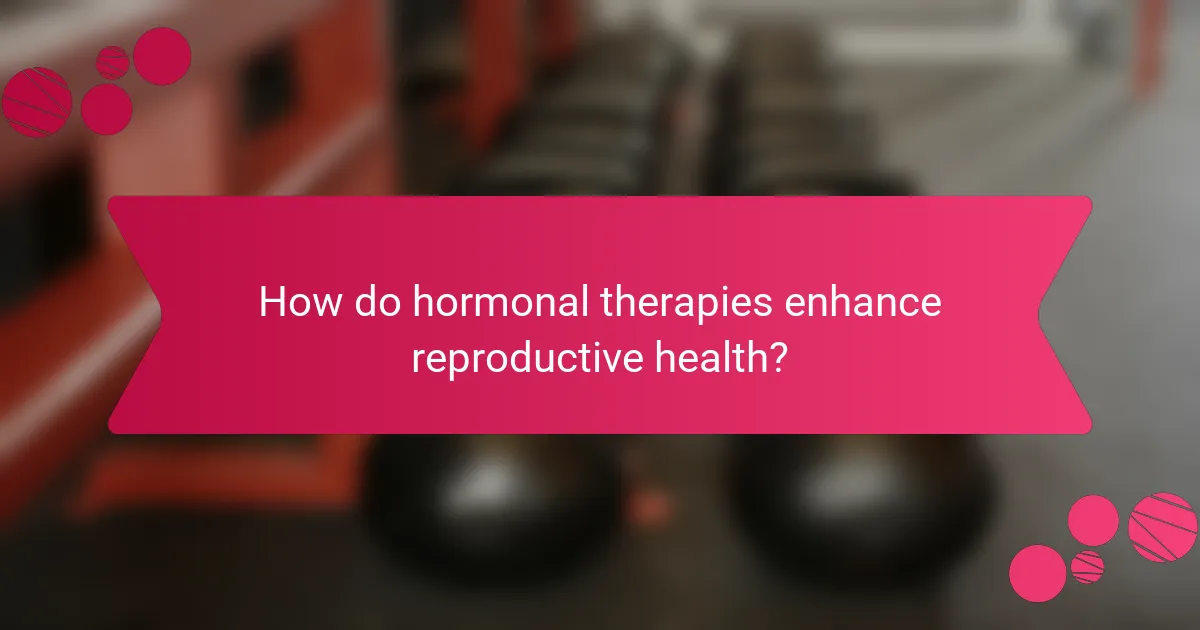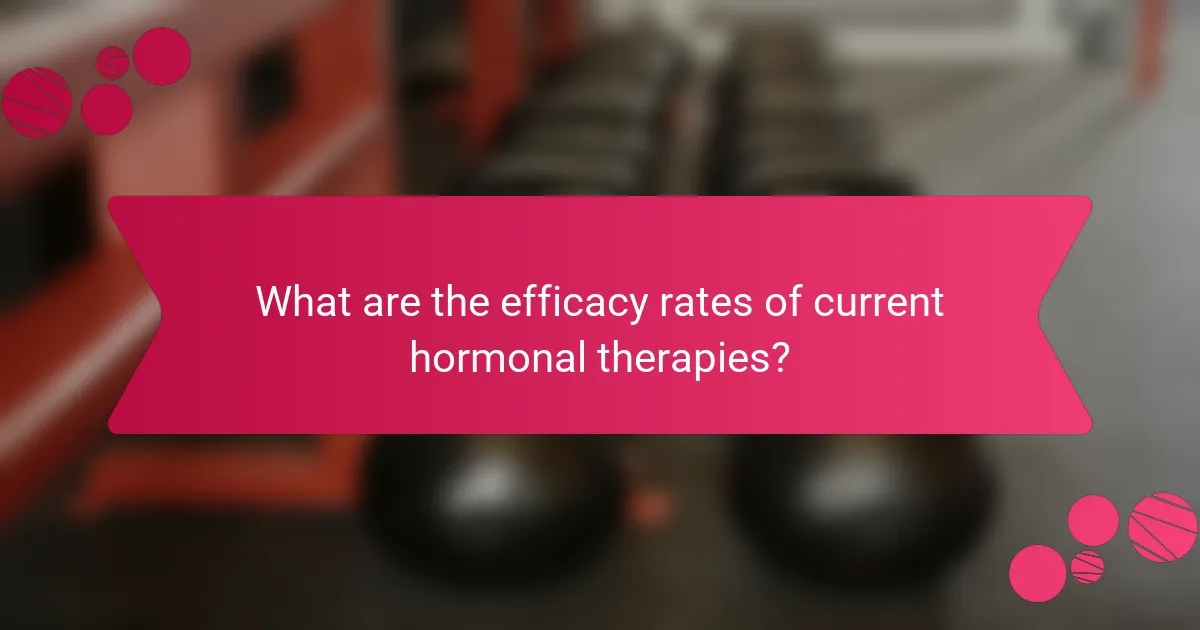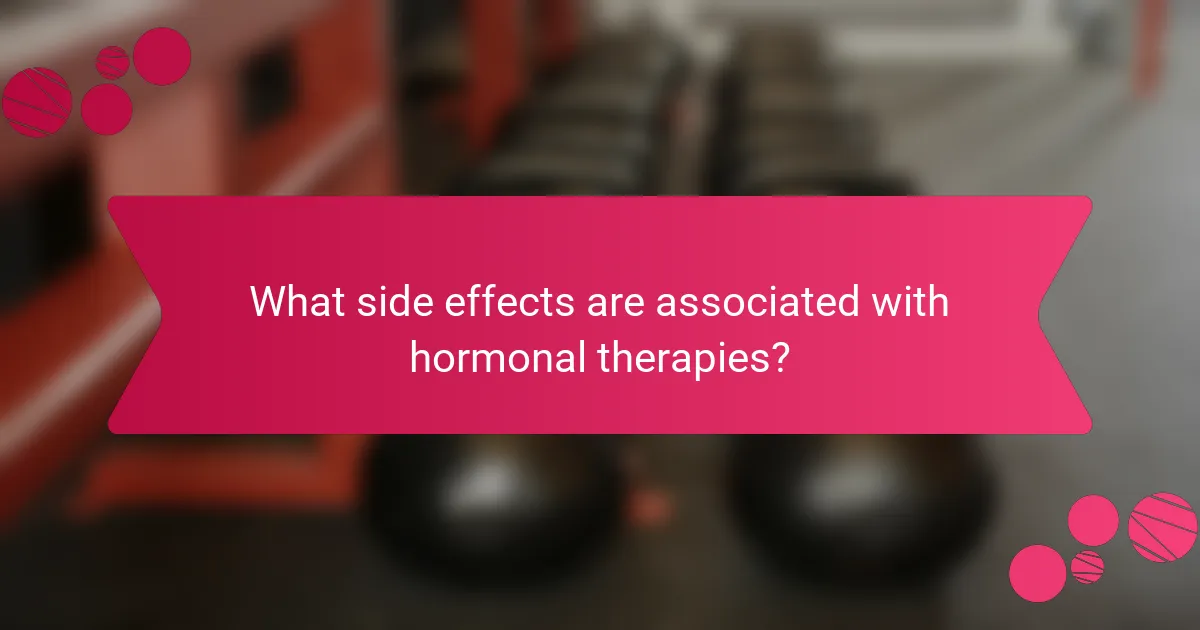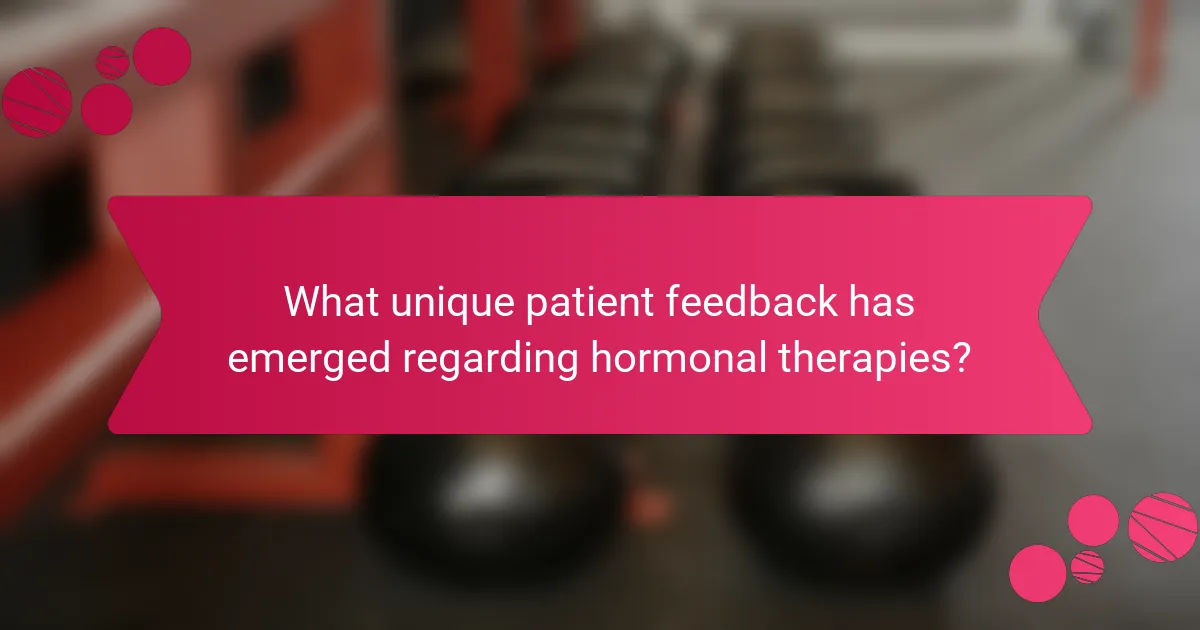Advances in hormonal therapies for reproductive health offer improved efficacy and reduced side effects, addressing vital patient concerns. These therapies regulate hormone levels, enhance fertility, and manage hormonal imbalances. Efficacy rates vary based on individual profiles and conditions treated. Patient feedback highlights both positive outcomes and challenges, emphasizing the need for personalized treatment plans.

How do hormonal therapies enhance reproductive health?
Hormonal therapies significantly enhance reproductive health by regulating hormone levels, improving fertility, and managing symptoms of hormonal imbalances. These therapies can increase the success rates of conception, alleviate menstrual disorders, and provide relief from conditions like polycystic ovary syndrome (PCOS).
Efficacy varies based on individual health profiles and specific treatments. Common hormonal therapies include oral contraceptives, hormone replacement therapy, and fertility medications. Side effects may range from mild (nausea, mood swings) to severe (blood clots, stroke). Patient feedback often highlights improved quality of life and reproductive outcomes, reinforcing the value of personalized treatment plans.
What are the primary mechanisms of hormonal therapies?
Hormonal therapies primarily function through modulation of hormone levels to address reproductive health issues. These therapies include mechanisms such as hormone replacement, suppression of hormone production, and alteration of hormone receptor activity. For instance, estrogen and progesterone therapies alleviate symptoms of menopause by replacing declining hormone levels. Additionally, medications like GnRH agonists inhibit the release of hormones that stimulate reproductive organs, effectively managing conditions like endometriosis. The efficacy of these therapies often correlates with patient feedback, highlighting the importance of individualized treatment plans.
Which conditions are treated with hormonal therapies?
Hormonal therapies are effective in treating conditions like endometriosis, polycystic ovary syndrome (PCOS), menopause symptoms, and certain types of hormone-sensitive cancers. These therapies regulate hormonal imbalances, alleviating symptoms and improving reproductive health. For example, estrogen and progesterone therapies are commonly used for menopause, while androgen blockers can help manage PCOS symptoms. Patient feedback often highlights the efficacy of these treatments, though side effects like mood changes and weight gain can occur.

What recent advancements have been made in hormonal therapies?
Recent advancements in hormonal therapies for reproductive health include improved efficacy, reduced side effects, and enhanced patient feedback mechanisms. New formulations and delivery methods have increased treatment effectiveness while minimizing adverse reactions. For instance, the introduction of personalized hormone therapy has led to better patient outcomes. Studies show that patients report higher satisfaction rates due to tailored approaches that consider individual hormonal profiles. Additionally, ongoing research is focusing on the long-term effects of these therapies, aiming to optimize safety and effectiveness over time.
How have delivery methods evolved in hormonal therapies?
Delivery methods in hormonal therapies have evolved significantly, enhancing patient experience and efficacy. Innovations include transdermal patches, subcutaneous injections, and intrauterine devices, which offer improved absorption and convenience. For example, transdermal patches provide steady hormone release, reducing side effects compared to oral forms. Patient feedback highlights a preference for non-invasive methods, leading to increased adherence and satisfaction. As a result, these advancements contribute to more personalized and effective reproductive health solutions.
What innovative formulations are being introduced?
Innovative formulations in hormonal therapies for reproductive health include bioidentical hormones and combination therapies. Bioidentical hormones closely mimic natural hormones, enhancing efficacy and reducing side effects. Combination therapies, which pair different hormonal agents, aim to optimize treatment outcomes and improve patient feedback. These advancements focus on personalized approaches, addressing individual needs and experiences in reproductive health management.

What are the efficacy rates of current hormonal therapies?
Current hormonal therapies show efficacy rates ranging from 70% to 90% in managing reproductive health issues. These therapies vary in effectiveness based on the condition treated. For instance, combined hormonal contraceptives often achieve a 99% efficacy rate with perfect use, while treatments for conditions like endometriosis may have rates around 70-80%. Patient feedback indicates that while efficacy is high, side effects can impact adherence. Common side effects include mood changes, weight gain, and nausea, which vary among individuals. Overall, ongoing advancements aim to enhance efficacy while minimizing adverse effects.
How do different therapies compare in effectiveness?
Hormonal therapies vary in effectiveness based on type and individual response. For instance, estrogen therapy often shows significant improvements in menopausal symptoms, while progesterone is crucial for endometrial protection.
| Therapy Type | Effectiveness | Common Side Effects | Patient Feedback |
|———————–|———————–|—————————-|—————————-|
| Estrogen Therapy | High | Nausea, headaches | Generally positive |
| Progesterone Therapy | Moderate to High | Mood swings, bloating | Mixed reviews |
| Combined Hormonal Therapy | High | Breast tenderness, fatigue | Positive for symptom relief |
| GnRH Agonists | High for endometriosis | Hot flashes, bone density loss | Positive for pain relief |
| Aromatase Inhibitors | High for breast cancer | Joint pain, fatigue | Positive for cancer management|
What factors influence the efficacy of hormonal therapies?
The efficacy of hormonal therapies is influenced by factors such as dosage, patient age, hormonal balance, and individual health conditions. Dosage affects the therapy’s effectiveness, while age can impact hormone levels and response. Hormonal balance is crucial for optimal results, and underlying health conditions may alter treatment outcomes. Additionally, patient feedback plays a role in adjusting therapies for better efficacy.

What side effects are associated with hormonal therapies?
Hormonal therapies can lead to side effects including mood changes, weight gain, and nausea. These effects vary based on the specific therapy and individual patient response. Common side effects include hot flashes, fatigue, and breast tenderness. Rarely, some patients may experience serious complications such as blood clots or liver issues. Monitoring and communication with healthcare providers are essential for managing these side effects effectively.
Which side effects are most commonly reported by patients?
Commonly reported side effects of hormonal therapies include mood swings, weight gain, nausea, and fatigue. Patients often experience changes in libido and menstrual irregularities as well. These side effects can vary in intensity and duration among individuals. Understanding these effects helps patients make informed decisions about their reproductive health options.
How do side effects vary across different demographics?
Side effects of hormonal therapies can vary significantly across demographics. Factors such as age, gender, ethnicity, and health status influence these variations. Older patients may experience different side effects compared to younger individuals due to hormonal changes. Women may report distinct side effects related to menstrual cycles, while men might experience different responses. Ethnic background can also play a role, as genetic factors may affect drug metabolism. Additionally, pre-existing health conditions can exacerbate or mitigate side effects, highlighting the importance of personalized approaches in hormonal therapy.

What unique patient feedback has emerged regarding hormonal therapies?
Unique patient feedback on hormonal therapies highlights both positive outcomes and notable side effects. Many patients report significant improvements in symptoms such as mood swings and menstrual regulation. However, some express concerns about side effects like weight gain and emotional fluctuations. Additionally, feedback indicates a desire for more personalized treatment plans to address individual needs. This underscores the importance of patient-centered approaches in hormonal therapy.
What are the common themes in patient testimonials?
Patient testimonials often highlight themes of improved quality of life, symptom relief, and emotional well-being. Many patients report significant positive changes in reproductive health after hormonal therapies. Common side effects mentioned include mood swings and weight changes, but these are frequently outweighed by the perceived benefits. Overall, testimonials reflect a mix of individual experiences, emphasizing the importance of personalized treatment plans.
How do patient experiences differ based on therapy type?
Patient experiences vary significantly based on therapy type, influenced by factors like efficacy and side effects. Hormonal therapies for reproductive health often yield positive feedback due to their targeted approach. For instance, patients report improved symptoms with combined hormonal contraceptives, while some experience side effects such as mood changes or weight gain. In contrast, non-hormonal treatments may lead to fewer side effects but often require longer durations to achieve desired outcomes. The choice of therapy ultimately affects patient satisfaction and adherence to treatment plans.

What are the best practices for managing side effects?
To manage side effects of hormonal therapies effectively, patients should follow specific best practices. First, maintain open communication with healthcare providers about any side effects experienced. Regular monitoring of symptoms can help in adjusting treatment plans. Second, consider lifestyle modifications such as a balanced diet and regular exercise to mitigate side effects. Third, utilize supportive therapies, such as counseling or support groups, to address emotional and psychological impacts. Lastly, adhere to prescribed medication schedules to ensure optimal efficacy and reduce the likelihood of adverse reactions.
Which strategies can patients employ for better outcomes?
Patients can employ several strategies for better outcomes with hormonal therapies. First, maintaining open communication with healthcare providers ensures tailored treatment plans. Second, adhering to prescribed medication schedules enhances efficacy. Third, tracking symptoms and side effects helps in timely adjustments. Fourth, engaging in support groups fosters shared experiences and coping strategies. Lastly, educating oneself about hormonal therapies empowers informed decision-making.
How should healthcare providers communicate about side effects?
Healthcare providers should communicate side effects clearly and empathetically. They must provide comprehensive information about potential adverse effects of hormonal therapies, emphasizing both common and rare side effects. Engaging patients in discussions ensures they feel supported and informed. Utilizing visual aids can enhance understanding, while follow-up consultations allow for addressing concerns.
What common mistakes should patients avoid when using hormonal therapies?
Patients should avoid common mistakes such as inconsistent usage, neglecting medical advice, and ignoring side effects. Consistency in taking hormonal therapies is crucial for efficacy. Always follow the healthcare provider’s instructions regarding dosage and timing. Additionally, monitoring side effects and reporting them can help in adjusting the treatment effectively.
